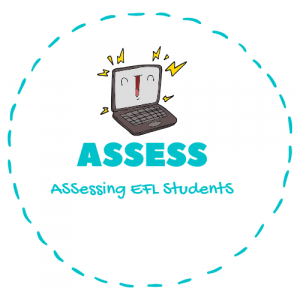ASSESS – BLOG / JANUARY 2022
Learning, Teaching and Training Activities for teachers: an asset for educational system
The arrival of information and communication technologies to the educational field, accelerated by the pandemic, has led to the need of development of digital competences of teachers, which is one of the educational challenges teacher training has to face now. One of the main aims of the Learning, Teaching and Training Activities that ran from 14th to 16th December in Athens, was sharing good practices and strategies among participants using digital tools. A range of teaching and learning activities and methodologies was suggested in order to provide engaging learning environments: creation and use of flashcards in the classroom, workshops about online tools and resources for EFL teachers, creative teaching and learning strategies using props and through theatre, etc.
Throughout these three-day training, teachers also had the opportunity to reflect together on the assessment process of different language skills (common problems and challenges) and received training on assessment strategies. The emphasis was led in particular on assessing writing and speaking skills with the guidance of easy-to-use rubrics helping out young learners do great at communicative skills, giving them really efficient specific feedback.
The consortium partners also took the opportunity to introduce the main output of the project: the Online Exam Creator, a digital platform that aims to support EFL teachers in their professional practice. After the presentation of the OEC, a workshop was conducted and participants could interact with the platform creating customized exams with the Exam Creator and creating teaching packs based on the material provided in the resource bank.
To conclude, the Learning, Teaching and Training Activities that took place in Greece, in the scope of ASSESS project, opened new paths of inspiration and fostered good practices among participants. Professional development and lifelong learning of teachers will always be an asset for the success and quality of learning.
To provide leadership, direction, and assistance to governments, educational institutions, and individuals across the world in order to promote excellence in language education, there are some non-profit organisations now, giving certificate about a world level standard of language teaching if your organisation can meet the necessary criteria.
These organisations like “Eaquals” and “Pearson” aim to provide language education providers with accreditation based on some requirements, develop practical materials for people working in the field of modern languages, as well as provide training and assistance.
On Language Learning for European Citizenship, above mentioned organisations aim to improve mutual knowledge and understanding, increase the quantity and quality of international cooperation, and combat prejudice and intolerance toward people of different languages and cultures.
Day by day, these organisations are growing to become professional organisations for language instruction in more and more countries including Turkey with a dozen of instutions, private or state schools, universities and so on.
In order to be one of these accredited members, the appying institution has to meet some requirements which are delivered after the application process. In a pre-determined time period, your institution is expected to fit in to certain standards of language education. The applying institution gets an advisory visit before the main inspection to assist the process. These aforesaid criteria are concerned with administrative and management quality assurance, the quality of learning environment, student and staff services and academic quality (including teaching and assessment processes)
In case of being entitled to the certificate, your institution and your students are regarded to have a higher standard of language education worldwide.
To be able to catch the zeitgeist, and to minimize the unexpected drawbacks of a non-centralized and more subjective methods of teaching and assessment, these organizations offer a more adaptable approach of language education to civil rights and one that respects more on equal opportunity for each student of your institution.
Here are the links for these organizations:
https://tr.pearson.com/tr/yuksek-ogrenim/yetkinlikler-gelisim/pearson-akreditasyonu.html
Learning a Foreign Language through Language Learning Apps
Mobile apps have been changing the way we communicate, shop, work, learn and entertain ourselves. Especially since the start of the Covid-19 pandemic their influence in our lives have been multiplied: We use communication and team-work apps for remote work almost everyday; we can do our grocery shopping through our mobile phones without going to the “crowded” supermarkets; we can practice our “daily workout” from home; and we can develop our knowledge and skills on various subjects, including a foregin language, while sitting on our sofa.
Indeed, language learning apps appear to be one of the most popular apps today; but how effective are they in making the learner gain necessary skills to understand, write and communicate in a foreign language? According to a research conducted by Shawn Loewen, a professor of second language studies, the apps are helpful in learning the basics of a language, but it remains to be difficult to use what is learnt in real life: “If you teach people explicitly to memorize vocabulary and grammar rules, most people will learn that. (…) But it’s much harder to take that knowledge and translate it into the ability to use language — to speak it, understand what you’re hearing, and respond in an appropriate way” [Read More].
Considering their user-friendliness and impact to a certain extent, such apps and other digital solutions can also be used as complementary tools in traditional language training and education at schools. In our project, ASSESS, we have been developing a tool as such, the Online Exam Creator (OEC), which aims at supporting EFL teachers with a pool of various teaching and assessment materials. The OEC tool is expected to be finalized by the end of 2021. Follow our website for more information.


